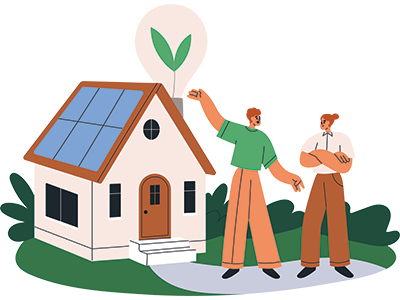Buying a House With Solar Panel Feed-In Tariff
The solar panel feed-in tariff was a government scheme that paid you for using renewable energy on your property, such as solar panels. The scheme officially closed new applications on March 31, but you can still purchase a property with a pre-existing tariff.
The 20-year contracts under the feed-in tariff deal are attached to the properties, not to the property owners. This means you will still be able to take advantage of the scheme on your newly purchased property.
This article covers what a feed-in tariff is, the incoming changes to the amount you'll be paid, and how a buyer can benefit from a property with a pre-existing tariff.
What is the feed-in tariff, and how much does it pay?
The feed-in tariff scheme was set up by the government to pay households for the electricity they generate, and also the unused energy put back into the grid via solar panels or wind turbines. The feed-in tariff is income tax-free and paid quarterly by energy suppliers. It is guaranteed for 20 years, and index-linked, so it rises with inflation.
To receive the full rate, the property must have an Energy Performance Certificate (EPC) of D or above. This needs to have been issued before the solar panels were installed.
As mentioned above, there is also an Export Tariff:
How much do you earn from the Export Tariff?
The Export Tariff is a payment for energy you generate with the solar panels that you don't use and send back to the grid (unless you have an export meter; it's normally assumed there's a 50:50 split). The export rate will be different depending on when the panels were installed:
The rate is 5.25p per kWh if installed between the 1st of April 2010 and the 31st of July 2012. If installed on or after the 1st of August 2012, the rate will be 7.39p per kWh.
If you're looking at purchasing a house with solar panels installed, and under the feed-in tariff scheme, you should consider the proposed changes by the government:
Proposed changes to the feed-in tariff scheme
The government is proposing a couple of options that would affect the feed-in tariff scheme. These plans would see the scheme move from the retail prices index (RPI) to the much lower consumer prices index (CPI); it's just a matter of when. The first option would involve an immediate switch from the RPI to the CPI. For option two, the feed-in tariff rates will be frozen and gradually increased to align with CPI rates.
Total Solar Installations up to 2026
Over 1.6 million houses in the UK have solar panels, with Ceredigion Preseli, Wales, having the most at 7,587. This represents about 5.6% of all UK households (out of 28.6 million total).
In 2025 alone, the UK saw a record year with roughly 228,000 to 250,000 new domestic rooftop installations, the highest annual figure in over a decade. Experts predict that 2026 will see a further 50% year-on-year growth, potentially adding over 325,000 more domestic systems by the end of the year.
Can you claim the feed-in tariff if you buy a house where solar panels are being leased?
When you lease solar panels from an energy company (they effectively lease your roof space for a period and in return give you reduced price or free electricity for the energy you generate in return), the company normally itself claims any payments from the feed-in and/or export tariff.
In general terms, this means that, unless the seller of the property with solar panels that you're buying actually owned the panels outright, it's unlikely that you'll be able to be remunerated by the feed-in and/or export tariff. You should, however, investigate the relevant contract's terms.
How do I get payments from the feed-in tariff when buying a solar-panelled property?
You must communicate with the energy company that the previous owner used and had a contract with. Once you know which company this is, simply ask the company to transfer the existing feed-in tariff contract, assuming it still has time left in the original 20-year term, to your name(s).
How do you find out who the seller's electricity supplier is?
This information should be in Property Information Form TA6 (click to find out more), which the seller has to fill in and send (via their solicitor) to your conveyancing solicitor.
If this information isn't given for any reason, you should immediately flag it up for further enquiry via your solicitor.
Does the feed-in tariff end if the energy company with which it was signed goes out of business?
No, the feed-in tariff does not end if the energy company you signed with goes out of business. The contracts were written so they are attached to the relevant properties, rather than to the people who signed them, as previously stated.
This means that even if, during the 20-year length of the contract, the energy supplier that originally signed it went bust, another energy company has to honour the contract's terms for the remaining duration.
An Ofgem spokesperson told us that there might be some work involved in finding a company to take on the remaining contract, but as a rule of thumb, this should not prove too difficult if you approach a large energy company.
- Fixed, competitive legal fees with no hidden costs.
- Expert conveyancing solicitors with proven local knowledge.
- No Sale, No Fee protection for your transaction. Terms apply.
- On 99% of mortgage lender panels.
- Fast completions.
- We can solve any property challenge.
Andrew started his career in 2000 working within conveyancing solicitor firms and grew hands-on knowledge of a wide variety of conveyancing challenges and solutions. After helping in excess of 50,000 clients in his career, he uses all this experience within his article writing for SAM, mainstream media and his self published book How to Buy a House Without Killing Anyone.
Caragh is an excellent writer and copy editor of books, news articles and editorials. She has written extensively for SAM for a variety of conveyancing, survey, property law and mortgage-related articles.










